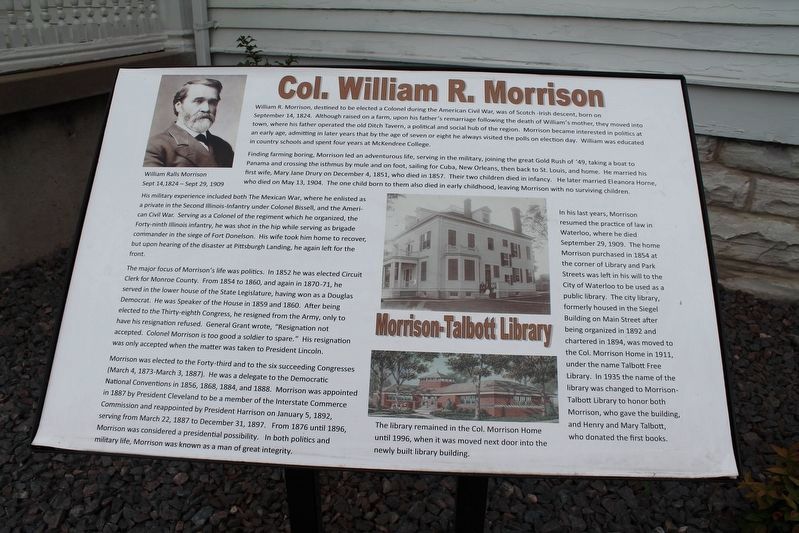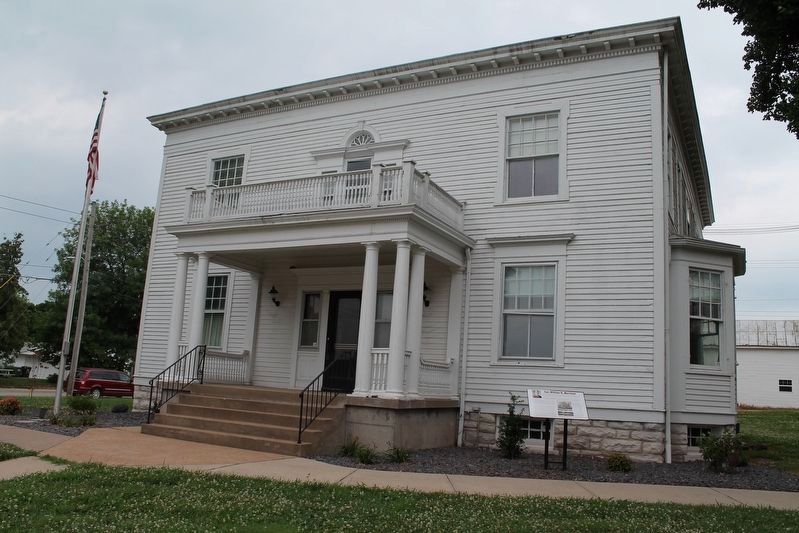Waterloo in Monroe County, Illinois — The American Midwest (Great Lakes)
Col. William R. Morrison
Finding farming boring, Morrison led an adventurous life, serving in the military, joining the great Gold Rush of '49, taking a boat to Panama and crossing the isthmus by mule and on foot, sailing for Cuba, New Orleans, then back to St. Louis, and home. He married his first wife, Mary Jane Drury on December 4, 1851, who died in 1857. Their two children died in infancy. He later married Eleanora Horne, who died on May 13, 1904. The one child born to them also died in early childhood, leaving Morrison with no surviving children.
His military experience included both The Mexican War, where he enlisted as a private in the Second Illinois-Infantry under Colonel Bissell, and the American Civil War. Serving as a Colonel of the regiment which he organized, the Forty-ninth Illinois Infantry, he was shot in the hip while serving as brigade commander in the siege of Fort Donelson. His wife took him home to recover, but upon hearing of the disaster at Pittsburgh Landing, he again left for the front.
The major focus of Morrison's life was politics. In 1852 he was elected Circuit Clerk for Monroe County. From 1854 to 1860, and again in 1870-71, he served in the lower house of the State Legislature, having won as a Douglas Democrat. He was Speaker of the House in 1859 and 1860. After being elected to the Thirty-eighth Congress, he resigned from the Army, only to have his resignation refused. General Grant wrote, "Resignation not accepted. Colonel Morrison is too good a soldier to spare." His resignation was only accepted when his matter was taken to President Lincoln.
Morrison was elected to the Forty-third and to the six succeeding Congresses (March 4, 1873-March 3, 1887). He was a delegate to the Democratic National Conventions in 1856, 1868, 1884, and 1888. Morrison was appointed in 1887 by President Cleveland to be a member of the Interstate Commerce Commission and reappointed by President Harrison on January 5, 1892, serving from March 22, 1887 to December 31, 1897. From 1876 until 1896, Morrison was considered a presidential possibility. In both politics and military life, M0rrison was known as a man of great integrity.
In his last years, Morrison resumed the practice of law in Waterloo, where he died September 29, 1909. The home Morrison purchased in 1854 at the corner of Library and Park Streets was left in his will to the City of Waterloo to be used as a public library. The city library, formerly housed in the Siegel Building on Main Street after being organized in 1892 and chartered in 1894, was moved to the Col. Morrison Home in 1911, under the name Talbott Free Library. In 1935 the name of the library was changed to Morrison-Talbott Library to honor both Morrison, who gave the building, and Henry and Mary Talbott, who donated the first books.
(captions)
William Ralls Morrison
Sept 14, 1824 - Sept 29, 1909
The library remained in the Col. Morrison Home until 1996, when it was moved next door into the newly built library building.
Erected 2017 by Morrison Talbott Library.
Topics and series. This historical marker is listed in these topic lists: Government & Politics • War, US Civil. In addition, it is included in the Former U.S. Presidents: #16 Abraham Lincoln, the Former U.S. Presidents: #18 Ulysses S. Grant, and the Former U.S. Presidents: #22 and #24 Grover Cleveland series lists.
Location. 38° 19.965′ N, 90° 9.156′ W. Marker is in Waterloo, Illinois, in Monroe County. Marker can be reached from the intersection of Park Street (Illinois Route 156) and South Library Street, on the left when traveling east. Touch for map. Marker is at or near this postal address: 219 Park Street, Waterloo IL 62298, United States of America. Touch for directions.
Other nearby markers. At least 8 other markers are within walking distance of this marker. The Morrison Talbott Library (a few steps from this marker); Waterloo City Hall (about 700 feet away, measured in a direct line); The Garretson Home (approx. 0.2 miles away); Henry's Grocery (approx. 0.2 miles away); The Schmitt-Nobbe Building (approx. 0.2 miles away); Harrisonville Telephone Company (approx. 0.2 miles away); The Advocate Building (approx. 0.2 miles away); The Braun Property (approx. 0.2 miles away). Touch for a list and map of all markers in Waterloo.
Credits. This page was last revised on July 11, 2019. It was originally submitted on July 11, 2019, by Sarah Deutch of Waterloo, Illinois. This page has been viewed 486 times since then and 41 times this year. Photos: 1, 2. submitted on July 11, 2019, by Sarah Deutch of Waterloo, Illinois. • Bernard Fisher was the editor who published this page.

